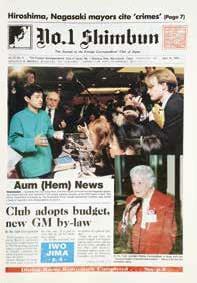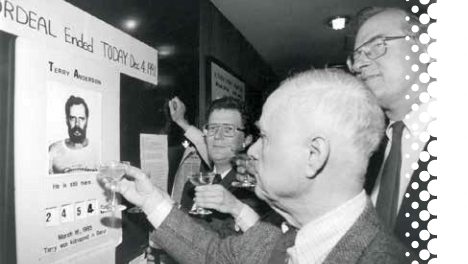Issue:

“Suddenly the Club is big news, with the mayors of Hiroshima and Nagasaki appearing . . . and the Aum Supreme Truth people meeting reporters at the FCCJ”
– cover of Vol. 27, No. 4,
Apr. 1995
Japan: hardly a feminist hell
It’s a chicken or egg question. Certainly the old boys’ network in Japan remains a powerful barrier that has shut women out and discouraged them from striving for the top notwithstanding the successes of such women as Chiaki Mukai, the astronaut, or Takako Doi, the Socialist politician. Yet if working women want to get ahead, they also have to pay their dues and not use their gender as an excuse to shirk responsibility.
One thing seems clear. If you ask me which gender seems more free and happy in Japan today, I would say women. . . .
The very fact that women are still shut out of the major corridors of power and thus social expectations to endure exam hell, enter the top corporations and become working drones seems, in one sense, their liberation. They seem less molded, more free to enjoy and develop other aspects of themselves and their lives. As a result, they strike me as better balanced and more expressive.
– Teresa Watanabe,
the Los Angeles Times,
Vol. 26 No 8, Aug. 1994
A drink for a friend
An extraordinary man, Terry Anderson even though he insists he isn’t. I saw him at the FCCJ, a returned to life survivor of 2,455 days in the hands of terrorists in Lebanon.
I bought him a drink that had been deferred for 13 years, recalling the man I knew then, admiring the remolded being I know now.
I met him first, those many years ago, at the home of Max Desfor, AP photo chief for Asia. Terry was just in from Detroit, where he had reported the disappearance of Jimmy Hoffa and the rise of a ruthless successor.Good guy, Terry engaging knowledgeable, easy to like. He reveled in his trade and was superbly efficient at it. I saw a young guy full of middle aged experience six years in the Marine Corps, time in Nam, cynical about Washington politics and State Department policy, tolerant even then of the gravest human faults.

Club Members celebrate Terry Anderson’s release, Dec. 4, 1991
I would long recall the last time I saw him, even the day May 31, 1979. . . . How could Terry and I have known that, from that time on, time would be spun in a berserk centrifuge and we were moving into an age of violent and inspiring change.
How could Terry have foreseen himself in a dark room in Beirut, talking knuckle rap code to Terry Waite, an Anglican churchman isolated in the next room?
I could only think back to that drink deferred day that some other time. . . . [After an interview] Terry proposed a quick drink trip to the officers club.
“Can’t, buddy,” I told him. “Gotta get back to Tokyo. Some other time.”That never happened. Terry moved on. I was in Seoul when I heard a radio bulletin. A name I knew had been seized and added to the hostage pile.
Terry Anderson held on iron leash, denied light and knowledge for months, not even told what the world knew that his father and brother had died.
Seven years, lost and stolen except Terry couldn’t look at it that way.
“No, I didn’t lose them. I loved them. I was there. I learned things, about myself and other people. I’ve changed in some ways, I hope for the better. I’m not going to let go of the things I got out of it.”
Chained and beaten, fed off the floor, heaped with every kind of physical and spiritual abuse how could any man, even one hardened in the Marine Corps mold, have retrieved life and self?
No ordinary man could have done this.
Wrong, said Terry.
“It is amazing what ordinary people can do. That’s just part of the human spirit.” I took a few minutes of Terry Anderson’s never look back future, putting that drink down beside him.
“I guess,” he said, “it’s going to be a long afternoon.”
And a long life, Terry, to a man who can know it as few other men do.
– Hal Drake, Pacific Stars and Stripes
Vol. 24 No. 8, Aug. 1992
Confessions of a tabloid journalist
The ethics thing. I studied ethics at school. At the time I thought it was a rather irrelevant, impractical subject. But how was I to know I’d be working for Fleet Street, where your ethical standards are constantly assailed from all manner of subtle angles? Now I wish I’d studied harder.
Take dolphins, for example. Some Japanese eat dolphins, and find them rather tasty. In Britain they eat all manner of disgusting things, but the British pantheon of hypocrisy enshrines dolphins, along with whales, seals and various other wildlife not commonly found around the British Isles, as things which only a rank barbarian, or outright murderer indeed, would eat. Being self righteous about another country’s eating habits is bashing at the most visceral level, of course.
One day a publication yet more scurrilous than the Mail rings me up and asks if I can find some Japanese people eating dolphins.
I found them. I picked up a girl at the dolphin counter in the supermarket; I got myself invited to a dolphin eating party; stories and pictures were front paged all over Britain a few days later. The story was entirely true. It was also the best paid story I ever wrote. I threw up. We may have no conscience, but some of us have queasy stomachs.
The day after that story ran, I visited a friend who works for a Japanese tabloid. “Look at this,” he said, and showed me that day’s page 2. “British article runs trumped up story about dolphin eating,” said the headline. “Can you believe it?” he said. “What a pack of lies.” I had no comment.
We are Malthusians in a carnivorous world. Fish eat water weed, dolphins eat fish, Japanese fishermen club dolphins on the head and then get kicked in the privates by the tabloid newspaper at the head of a cruel eco system. Then the Japanese tabloids prey on the pickings.
– Tom Gill,
Vol. 22 No 1, Jan. 1990
A journalist’s primer on word processors
Nowadays, computer memory is cheap and plentiful. Consider the Tandy 100 with 0.022Mb of memory.
– Tom Koppel
Vol. 22 No. 4
Apr. 1990
1992: The New List
What is hot and what is not in Tokyo and Japan
IN
The Hanada Brothers
Rie Miyazawa
Kiichi Miyazawa
Calpis Water
Sun-blocking hose
Narita Express
California wine
Foreign beef
American football
Safe sex
Meiji milk stock
Mako
Pyroclastic
Karaoke box
New World Order
Yoshiaki Mori
OUT
Chiyonofuji, Onokuni
Akina Nakamori
Toshiki Kaifu
Buttermilk
Leather skirts
Limousine Bus
Beaujolais Nouveau
Natto
Rugby
Promiscuity
NTT stock
Junko
Sekuhara
Pub crawling
Global partnership
T. Boone Pickens
Why Japan crashed
We Americans invariably tend to imagine Orientals as wise, patient and cunning. In movies and on television, the Japanese especially seem cool and calculating, in counterpoint to the plodding Americans.
Such images, reinforced by the success with which the Japanese sold us everything from automobilies to television sets, made it easy to imagine several years back that we faced a future controlled by the clever Japanese. In early 1989, columnist Jack Anderson darkly warned: “From Manhattan to Waikiki, they have bought up prime real estate and started up new plants. Japan is building a sub economy in America that is outproducing the regular economy.
“This could also lead eventually to the collapse of American manufacturing. It also gives Japan a dangerous measure of control over our economy. Every so subtly, control is shifting from Washington to Tokyo.”
Such ominous prophecies were echoed by pundits from left to right, from liberal investment banker Felix Rohatyn to conservative publisher Malcolm Forbes, from journalists like Susan and Martin Tolchin to erstwhile strategist Edward Luttwak: The United States was facing a people who combined wisdom and cunning with an unbreakable national discipline that made Japan the tidal wave of the future. . . .
– Richard Pyle, AP, Vol. 18 No. 2 , Feb. 1996
Bush’s Collapse Triggers Tape Turmoil
The complete, vivid videotape of President Bush throwing up all over Prime Minister Kiichi Miyazawa was available that same night but U.S. and Japanese TV news editors did not know it existed for at least 48 hours, No. 1 Shimbun learned. What most viewers saw on Jan. 8 was the unauthorized and abbreviated coverage by NHK, of the American leader on the floor at the state banquet, being treated for nausea and stomach flu.
Two days later, Tom Reid, the Washington Post bureau chief, reported that the entire sickening series of events had been captured on tape. “President Bush reeled, vomited, passed out and toppled from his chair in a faint,” Reid reported. “The tape, which shows a frightened Barbara Bush leaping to assist her husband, was viewed by the WP. It has not been broadcast in Japan or the U.S., and officials of the network that was responsible for filming the dinner denied that such a tape existed. . . .
“[The] tape was shown in London on Channel 4,” [ABC-TV’s John] Herrick said. . . . For a few days no one realized the British station had a world wide TV beat. In any case, ABC got the tape and showed it in the U.S. That led the Japanese networks to protest that the Americans had scooped them with the full, disgusting footage. . . . So, to salvage international cooperation, the full tape was released to the Japanese networks and finally the populations of both nations were able to watch Bush do his number on Miyazawa.
Footnote: According to Reuters, Barbara Bush said she knew the president wasn’t seriously ill because, while he lay on the floor, she heard him say to Miyazawa, “Why don’t you roll me under the table and I’ll sleep it off while you finish dinner.”
– Our Video Correspondent, Vol. 24 No. 1, Jan. 1992

